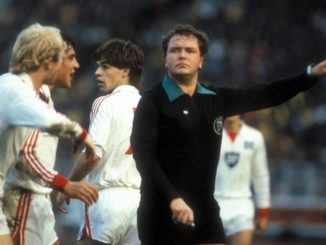
Karlsruher SC 7-0 Valencia CF (UEFA Cup) – Wildparkstadion, 2 November 1993
The Wunder vom Wildpark
German football history is full of miracles, the word Wunder being used to describe plenty of great games and moments. The Wunder vom Wildpark, that took place on the night of November 2nd, 1993 is a perfect example.
Karlsruher SC playing in the UEFA Cup was a miracle in itself. KSC had never played in Europe before, but qualified after finishing 6th in the 1992/93 Bundesliga season. That they made it through the first round against the giants of PSV Eindhoven was very unlikely too.
But there were greater miracles to come in the second round. Karlsruhe beat Valencia CF 7-0 in an unbelievable second leg, the club’s greatest ever win and the worst loss in Spanish football history. And what could be more miraculous than four of the goals being scored by Edgar Schmitt, who had only turned pro aged 28 – and had survived a serious car accident only days before the game?
In stark contrast to the Baden club, Valencia were one of the competition’s glamour sides. Top of the La Liga table going into the second leg, Los Che had a few big names, not least coach Guus Hiddink who’d lifted the European Cup with PSV just five years earlier. The Spaniards won the first leg 3-1. Future Champions League winner Predrag Mijatovic opened the scoring in the first half by rounding Karlsruhe’s young goalkeeper Oliver Kahn, before Lubo Penev added two more. Shortly before the end, KSC’s Manfred Bender delivered one of his trademark free kicks, curled onto the head of forward Edgar Schmitt, who headed in an away goal and kept his side in the tie.
The Wildpark goes wild
The hosts made it clear the second leg wouldn’t be easy from the very start. Every Valencia touch was whistled, including the kick-off, which had to be done twice because Karlsruhe had already tackled the ball away before Valencia had actually taken it. Within the first few minutes, a few crunching tackles had already come in. Coach Winfried Schäfer knew Valencia’s weaknesses, thanks to former Gladbach teammate Jupp Heynckes. Heynckes was coaching in Spain with Athletic, and had helped out with a scouting report.
It was an even game until the half-hour mark, before the tie suddenly turned in just eight minutes. First Bender found Schmitt with a cross, like in the first leg, and Schmitt prodded in. 1-0. Minutes later he added a second, putting Karlsruhe ahead on away goals. In the 38th minute, Rainer Schütterle gave the hosts the aggregate lead for the first time with a brilliant lob over the onrushing Spanish goalkeeper Sempere. Karlsruhe were in complete control, and Schütterle should have made it 4-0, but in the dying moments of the half they instead offered Valencia a route back in. Juan Antonio Pizzi hit the post and had his rebound cleared off the line, and Valencia then hit the woodwork again from the resulting corner. Nevertheless, KSC survived.

At half time Schäfer gave his side a rousing speech. He wasn’t actually supposed to be there – UEFA had given him a touchline ban after the first round, and he had spent the first half in one of the boxes in the main stand, with broadcaster SAT.1 interviewing him during the game. His speech was cut short when a UEFA official appeared, forcing Winnie to hide behind the door.
Whatever he said, it worked. Ten seconds after kickoff Valencia were forced to concede a corner, and when they couldn’t properly clear, Valeriy Shmarov shot through a crowd of bodies past the unsighted goalkeeper from outside the box. The Spanish side would now need at least three goals to progress. They barely managed three shots.
The birth of Euro-Eddy
On the hour Schmitt managed his hat-trick – a header from a Manni Bender free kick. As soon as Karlsruhe got the ball back, he scored once more – his fourth goal, KSC’s sixth. Commentator Jörg Dahlmann went poetic – “How beautiful can football be, how beautiful can the Europapokal be”. Dahlmann once again used Schmitt’s new nickname, Edgar “Looping” Schmidt. Schmitt had crashed his car in the week leading up to the match, writing off the car and rolling it four times. He escaped almost unhurt, but he was lucky to be playing, let alone playing the game of his life. The “Looping” nickname didn’t last. From now on, he was Euro-Eddy. The four rolls of his car were forgotten in favour of his four goals.
At the end of the game, Slaven Bilic made the rout complete with a header from another Bender set-piece. 7-0, equalling Valencia’s record defeat to this day (despite the best efforts of Gary Neville). The biggest defeat of any Spanish team in European competition, also to this day. Guus Hiddink was fired soon afterwards.

Karlsruhe continued to surprise after knocking out Valencia. They drew Bordeaux in the next round, a team containing the likes of Zinedine Zidane, Christophe Dugarry, Bixente Lizarazu and Richard Witschge, again caming back from a first leg defeat to win the tie. KSC then beat Boavista in the quarter-final, but lost on away goals in the semi-final to Austria Salzburg, in perhaps the only game where they were favourites.
The club would return to the UEFA Cup twice more in the following years, but didn’t make it past the third round. In 1998, they were unexpectedly relegated, and by 2000 they were down in the Regionalliga. That same year, Valencia reached the first of two consecutive Champions League finals.
Karlsruher SC: Kahn, Carl, Bilic, Wittwer, Bender, Rolff, Schuster, Shmarov, Schmitt, Kiryakov, Schütterle – Subs: Krieg, Klinge – Coach: Schäfer
Goals: Schmitt (29, 34, 52, 63), Schütterle (37), Shmarov (46), Bilic (88)
Valencia CF: Sempere, Belodedici, Sanchez Flores, Pérez Serer, Camarasa, Giner, Rivera, Fernando, Cervera, Mijatovic, Pizzi – Subs: Gálvez, Eloy – Coach: Hiddink
This article is part of a new series on Bundesliga Fanatic entitled German Football’s Greatest Games. Celebrating 120 years since the first ever German football championship and 60 years since the first Bundesliga season, we’ll be going back through the country’s footballing history and writing about some of the most important and most memorable games Germany has ever seen.
Click the tag ‘German Football’s Greatest Games’ to see all the entries in the series.



